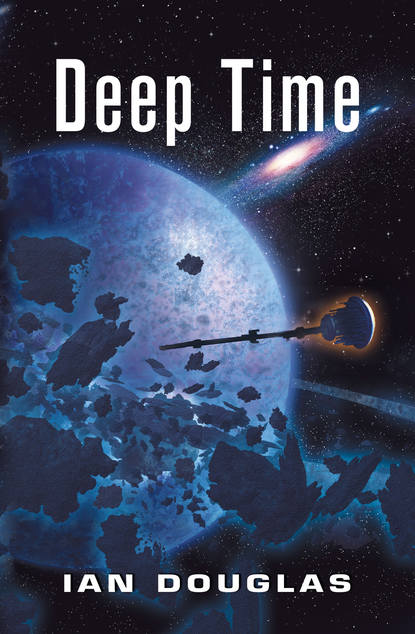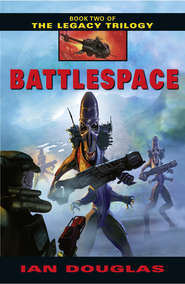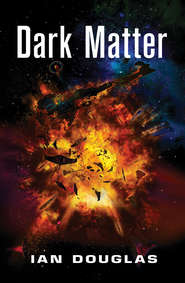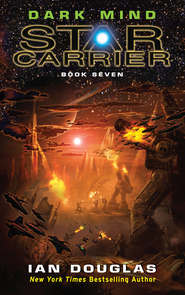По всем вопросам обращайтесь на: info@litportal.ru
(©) 2003-2025.
✖
Deep Time
Настройки чтения
Размер шрифта
Высота строк
Поля
She checked her nav data and realized that she was the closest of the four fighters to the target.
“This is Demon Five,” she reported. “I’m going to try to close with Charlie One.”
“Copy that, Five,” Mackey’s voice came back. “For God’s sake watch yourself.”
Watch yourself get blown out of space, she thought, but she said only, “Affirmative.”
She began closing with the alien.
USNA Star Carrier America
In pursuit
0140 hours, TFT
“One of our fighters is docking with the alien,” Commander Mallory told Gray. “It’s confirmed: Charlie One has stopped accelerating.”
“About goddamned time,” Gray said. “Pass the word, though. Do not attempt to board the alien alone. I want them to wait until we have some capital ships there to back them up. And we’ll need SAR tugs to slow Charlie One the hell down.”
“Aye, aye, sir.”
America carried a number of search-and-rescue craft, and the UTW-90 space tugs of the carrier’s DinoSAR squadron were specifically designed to rendezvous with streakers: ships damaged in combat at relativistic speeds, hurtling off into deep space at near-c velocities and unable to decelerate. SAR tugs could link up with fast-moving hulks, recover their crews, and slow them down to more manageable velocities.
“They can try for an AI link,” Gray went on, “but no physical contact.”
They were going to do this right. There were too many unknowns floating around out here to risk some fighter pilot putting his or her foot in it.
“And what if the aliens decide not to cooperate?” Mallory asked.
“Then they’ll keep until we get there with the big guns.”
“I presume you don’t mean literal weapons.”
“No,” he said, a little exasperated by the question. “But America’s AI should be able to pry them open electronically.”
Combat for over half a century with half a dozen different Sh’daar species had given humans plenty of opportunity to learn about Sh’daar computer networks and protocols. In particular, contact with one alien species, the Agletsch, had introduced humans to various Agletsch artificial languages—especially their trade pidgins, which allowed various members of the Sh’daar Collective to communicate with one another. Language, it turned out, was as utterly dependent on a given species’ physical form as it was on their psychology. There were galactic species that communicated by changing color, by modulating burps of gas from their abdomens, and by the semaphore twitchings of appendages on what passed for faces. The huge, floating-gasbag H’rulka broadcast on radio wavelengths. The Turusch lived in closely bonded pairs, and the speech of one harmonized with the speech of its twin, giving rise to a third layer of meaning. The Slan, who “saw” in sonar, communicated in patterns of rapid-fire ultrasound clicks at wavelengths well beyond the limits of human hearing. With such a bewildering range of communication types and styles, it was amazing that anyone in the Galaxy could exchange even the simplest ideas with anyone else at all.
But that was where the super-AIs came in, the immensely powerful computer minds billions of times faster and more powerful than mere organic brains. Some were designed solely to crack alien languages; shipboard systems had language software developed by those specialized AIs.
Even so, it was never easy. There were no guarantees that an unknown language could be cracked at all. Mostly, Gray was hoping that the aliens on board Charlie One had met the Agletsch, and used one of their pidgins.
If they were actually a part of the Sh’daar Collective, though, they would have to have a way to communicate with other Collective members.
More than that, Charlie One had been on Earth, which meant its crew had been in touch with the Earth Commonwealth—and that meant they almost certainly spoke a language humans (or their AIs) could understand.
Gray wondered if Charlie One was carrying an ambassador of some kind. Not that the Sh’daar had ever shown any evidence of understanding the concept of ambassadors or of the niceties of diplomatic service. Agletsch traders were the closest thing humans had encountered yet to Sh’daar diplomats. For even though those damned spiders never did anything for free, their stock-in-trade was information … and in so far as diplomacy involved an exchange of information and of understanding, they were naturals in the role.
But, so far, at least, there were no generally accepted rules on the galactic stage as there were for human diplomats—no embassies or consulates or formal exchanges of ambassadors. It had occurred to Gray on more than one occasion that this was one reason the Sh’daar War had dragged on for so long. Even the defeat of the Sh’daar in their home time and space had led to only an informal and non-binding truce. Twenty years after Koenig had emerged victorious from the N’gai Cloud in the remote past, human space was being raided by the Slan.
And now Charlie One was in the picture. What the hell had that ship been doing in North India?
That was one reason for giving the order not to attempt contact until America had arrived.
He didn’t want to hear about this one secondhand.
Emergency Presidential Command Post
Toronto
United States of North America
0725 hours, EST
“It looks like a full day for you, sir.”
President Koenig looked up at Marcus Whitney and scowled. “Where’s my coffee, damn it?”
“Right here, sir,” Lana Evans said, reaching past Whitney and placing the cup on his desk. “Anything else, Mr. President?”
“No. Thank you.” He glowered at Whitney. “What do we have?”
“Most of it is focused on what’s happening in Europe right now, sir, and throughout the Confederation. After the battle at Verdun yesterday, the entire Confederation appears to have collapsed.”
“And about damned time, too,” Koenig said. He was tired after far too little sleep, and he needed his coffee. He’d been up until nearly three that morning, following reports streaming in from the star carrier America. When he’d gone to bed, America was still maneuvering, trying to match course and speed with the alien. A fighter had already docked with Charlie One, and two SAR tugs had been launched, but it would be hours yet before there would be any solid information from out there, now out well beyond the orbit of Neptune.
He sipped his coffee, made a face, then looked up at Whitney. “Okay. What else?”
“Here you go, sir,” Whitney said, thoughtclicking on his own connection with the electronics in the presidential office. “It’s all on the Pickle.”
He was referring to the “PICKL,” a centuries-old acronym standing for “President’s Intelligence ChecK-List.” It had first appeared in the mid-twentieth century as the CIA’s daily briefing for the U.S. president on important events that had occurred throughout the world overnight. Eventually it had vanished, world events having become too complex to be so easily distilled.
Recently, though, the idea of the PICKL had been revived in electronic form. World events were more complex than ever, including as it did not only news from all over Earth, but from colonies across the entire solar system and out among the nearer stars as well. The ocean of information flooding in at every moment was too large and complex by far for any one man to follow, information of which the president of the USNA needed to be aware. The current PICKL was created by a metanetwork of super-AIs operating within the government, the military, and for the various national intelligence services—Konstantin, on the Moon, was a major participant—and in large part was the network responsible for boiling that ocean down to teacup size.
Koenig ran down the list of briefings. At the top of the list was the capture of the alien starship, code-named Charlie One. It would be hours yet before America’s SAR tugs would catch the vessel and begin decelerating it. Until that happened, it was still hurtling outbound, now well past the orbit of Neptune and out into the Kuiper Belt. Details were sketchy, but evidently a fast-thinking fighter pilot off the America had used a drone to interfere with the alien’s singularity projector. Something important had clearly burned out; if it hadn’t, Charlie One would have slipped into metaspace long ago and been gone.
I’ll have to commend that pilot later, he thought. Another urgent point on the list caught his eye. It had to do with Charlie One’s apparent destination, in the constellation Cancer. He decided to study that later, too.
He moved to another item: closer to home there was a revolution against the Confederation government in South India, clashes between Chinese special forces and Russian troops in the Siberian maritime province, religious riots and demonstrations across the Theocracy, and massive flooding from a storm surge in the Philippines that almost certainly would foment unrest.
It went on:
A breakthrough in communicating with the Slan at Crisium … suspected sabotage in the Mt. Kenya space elevator … yet another formal protest by the Papess in Rome denouncing the White Covenant … government collapse in Geneva … possible Sh’daar activity at 70 Ophiuchi …
In short, very much business as usual. With the USNA walking the proverbial knife’s edge between survival and disaster on a dozen fronts.
“The big thing on the docket for today,” Whitney said, interrupting Koenig’s perusal of the list, “is the Washington dedication.”
Koenig groaned. “I don’t suppose we can put that off?”











